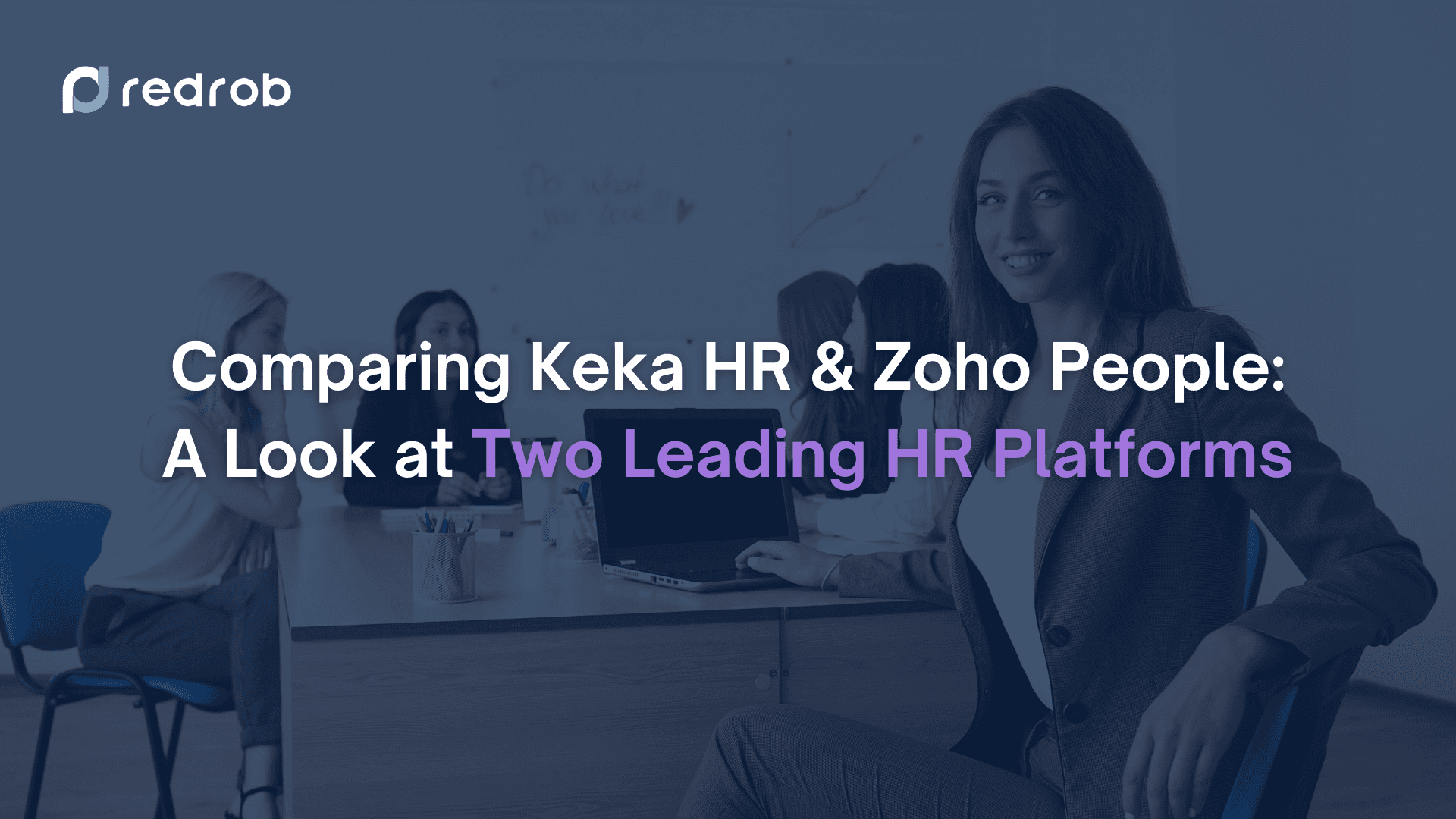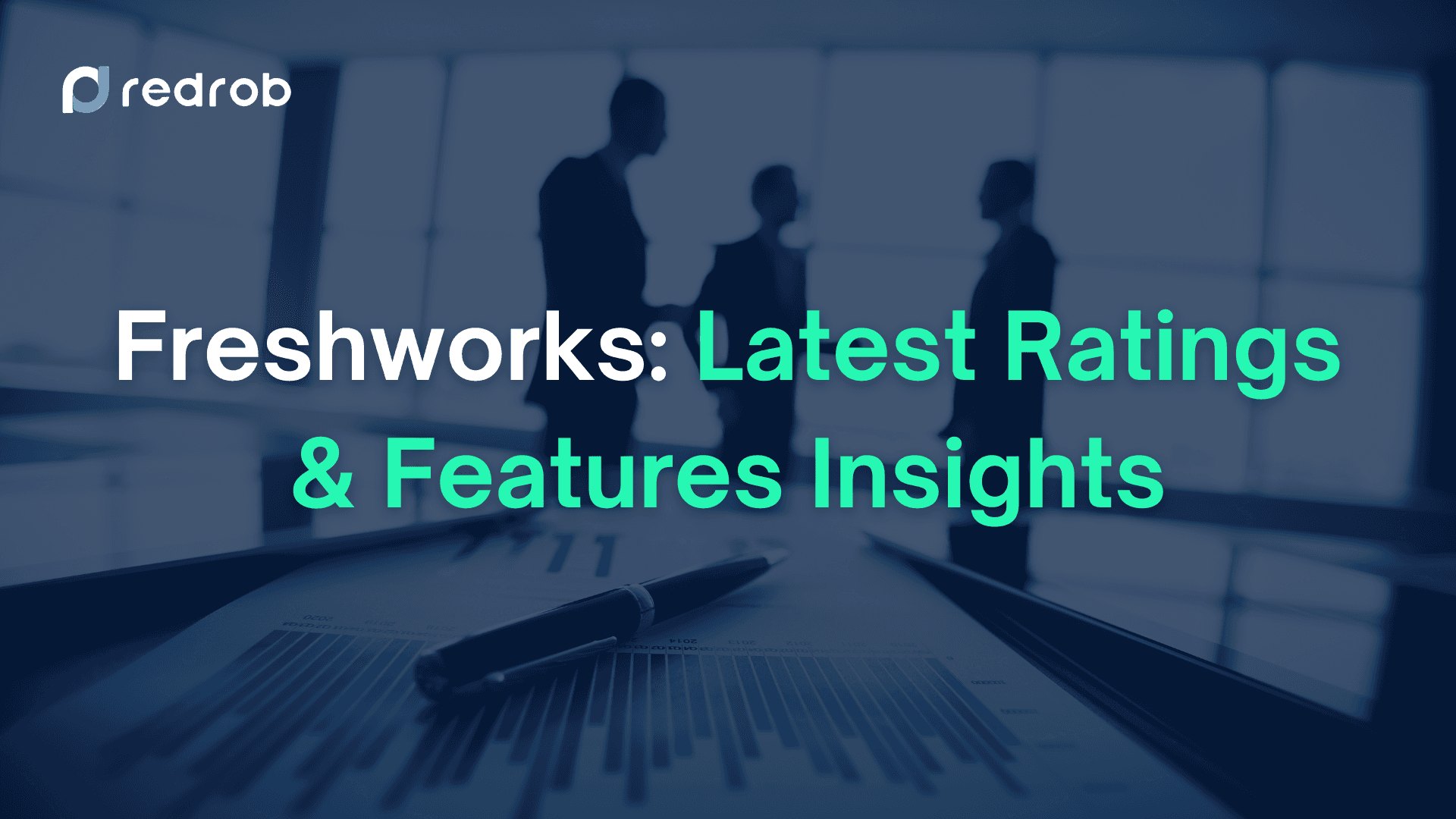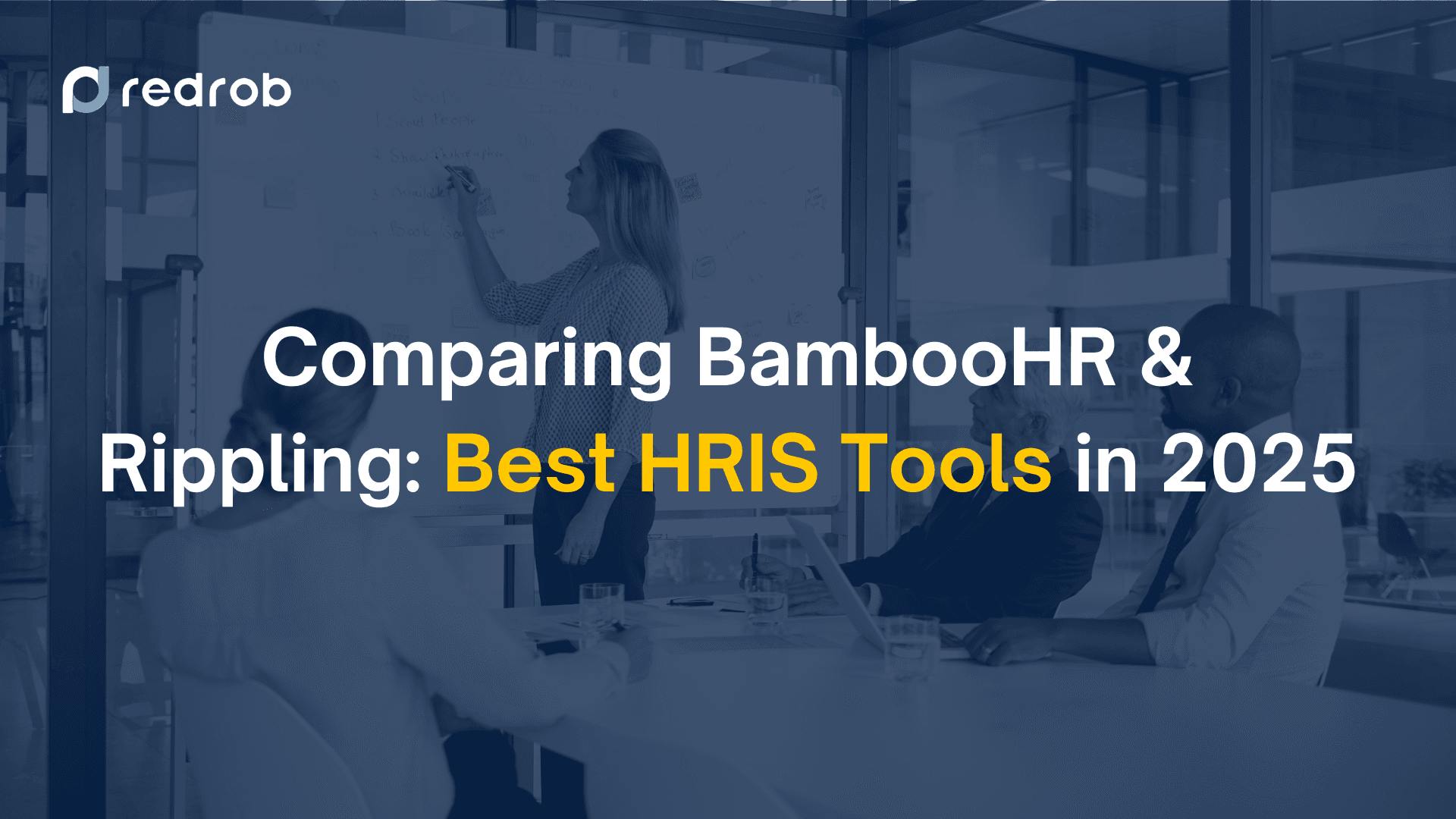HR Platforms
10 mins read
•
Jan 24, 2025

Kartikey Handa
Businesses with streamlined HR processes can significantly reduce their operating costs. If your growing team is struggling with payroll and performance management, it might be time to rethink your HR software.
Choosing the right HR software can transform your business, but how do you decide between platforms like Keka and Zoho People? Both promise to streamline your HR tasks, but their approaches are vastly different.
As your team expands, managing HR tasks can become overwhelming. The right software can turn chaos into clarity, ensuring your HR operations scale with your business. Keka simplifies payroll management with automation, while Zoho People offers a complete HR suite with seamless integrations.
In this blog, we’ll compare Keka vs Zoho People, helping you identify the best fit for your business’s unique needs. Keep reading to explore the strengths and weaknesses of each platform and discover how you can further streamline your HR processes.
What is Keka?

Keka is a modern HR platform tailored for small to medium-sized businesses. It simplifies payroll management, employee attendance, and time tracking. Founded with a mission to streamline HR processes, Keka focuses on automating routine tasks. This helps HR teams save time and improve efficiency.
Its core features include employee data management, seamless payroll processing, and precise attendance tracking. With a user-friendly interface, Keka ensures even non-tech-savvy users can handle HR tasks effortlessly.
While Keka comes with various outstanding features, its robust payroll automation ensures compliance with labor laws. It simplifies tax calculations, statutory deductions, and disbursement, which is ideal for businesses prioritizing accuracy.
For small to medium-sized businesses, Keka offers affordability without compromising functionality. This makes it a trusted choice for companies looking to enhance HR efficiency.
When comparing Keka vs Zoho People, Keka stands out for its payroll precision and compliance focus. Its design ensures businesses manage HR tasks confidently and efficiently.
What is Zoho People?

Zoho People is a cloud-based HR platform designed to streamline employee management and engagement. It caters to businesses of all sizes, offering customizable solutions that scale as companies grow.
The platform’s core features include performance tracking, leave management, and employee self-service. Zoho People also focuses heavily on employee experience, allowing workers to access their profiles, policies, and requests from anywhere. It supports continuous feedback, making performance appraisals more dynamic and less time-consuming.
One of Zoho People's strongest advantages is its seamless integration with the broader Zoho ecosystem. It connects effortlessly with Zoho CRM, Zoho Recruit, and other business tools. This integration allows you to manage multiple functions within a single platform, reducing the need to juggle various software.
Businesses across industries—whether small startups or large enterprises—benefit from Zoho People's flexible pricing plans. In the Keka vs Zoho comparison, Zoho People stands out for its comprehensive suite of tools. It's particularly valuable for companies already using Zoho’s applications, as everything syncs smoothly.
Key Features Comparison: Keka vs Zoho People

When choosing an HR management software, features are the most critical factor to evaluate. Employee management, performance tracking, learning, and time management directly impact how efficiently your HR team operates. Let’s break down how Keka vs Zoho People compares across these essential categories.
Employee Management
Employee management is at the core of any essential HR tool for professionals. It covers everything from storing employee data to handling leave requests and payroll. A strong system helps you automate routine tasks and focus more on employee engagement.
Keka excels at payroll automation and leave tracking. You can automate salary processing, handle tax deductions, and track leaves in real time. This feature is particularly useful for businesses dealing with compliance and attendance accuracy.
Keka’s payroll feature can manage statutory compliance across different regions, reducing manual errors. If payroll precision is a priority, Keka is your go-to option.
Zoho People takes a broader approach to employee management. It offers employee self-service, where staff can update their profiles, apply for leave, and raise requests without needing HR assistance.
The platform also includes case management, allowing employees to report issues directly to HR and track progress. This feature is especially helpful for larger companies handling multiple employee requests daily.

Performance Management
Tracking employee performance is essential to ensure your team stays motivated and aligned with company goals. Effective performance management can improve productivity and help retain top talent.
Keka focuses on structured goal-setting, performance tracking, and employee reviews. Managers can set goals, track progress, and provide feedback at regular intervals.
However, Keka’s performance management is more traditional, making it ideal for companies that prefer formal appraisal cycles. If you need a structured review system, Keka can cover those needs.
Zoho People offers a more dynamic approach. It emphasizes continuous feedback, enabling employees to receive input throughout the year.
The platform also provides 360-degree feedback, allowing employees to gather input from peers, subordinates, and managers. This holistic approach helps improve overall performance transparency and accountability.
Learning and Development
A learning management system helps companies upskill their employees and keep them competitive. It’s essential for employee growth, retention, and adapting to changing business needs.
Keka doesn’t offer extensive learning management tools. While it supports basic training modules, it lacks advanced features like quizzes or virtual classrooms. This might not be a dealbreaker for smaller businesses, but if learning and development are top priorities, you may need additional tools.
Zoho People provides more robust learning options. You get blended learning capabilities, including in-person training, online courses, quizzes, and virtual classrooms.
The platform also allows you to assign courses based on employee roles and track progress in real time. This makes Zoho People a better fit for companies focused on continuous employee upskilling.
Time and Attendance Tracking
Time and attendance tracking is crucial for managing payroll accuracy and compliance. It ensures employees are compensated fairly for the hours they work.
Keka offers reliable time tracking and shift scheduling. You can track employee working hours, overtime, and shifts with minimal manual intervention. The system also integrates with biometric devices, ensuring accurate attendance records. This feature is valuable for businesses with rotating shifts or remote employees.
Zoho People provides a more advanced time tracking system. It supports shift management, leave approvals, and automatic attendance logging. The platform can also set up geofencing, ensuring employees check in only from designated locations. This is particularly useful for field staff or businesses with multiple offices.
Now that we’ve discussed the core features, let’s see how Keka vs Zoho People compares in terms of usability and overall experience.
Usability and User Experience
Imagine spending hefty resources on HR software and your team finds it too complex to use. Therefore, usability and user experience are critical when selecting a platform to manage HR operations. A complex system can frustrate users and slow down daily operations, while a simpler one boosts productivity. In this section, we’ll compare Keka vs Zoho People on interface simplicity and mobile access.
Interface and Ease of Use
A well-designed interface helps HR teams complete tasks faster and with fewer errors. The user interface should be simple so that users from different backgrounds can easily handle tasks using it.
Keka’s interface is designed for simplicity. It has a clean, intuitive layout that focuses on core HR tasks. Even first-time users can quickly get started without much training.
Menus are straightforward, with payroll, attendance, and performance tools easy to access. For small to medium-sized businesses without a dedicated IT team, Keka's simplicity is a major plus. You spend less time figuring out the system and more time on actual HR work.
Zoho People offers a more customizable interface, but it’s also more complex. You can adjust workflows, forms, and reports to suit your business needs.
However, this flexibility comes with a learning curve. Users may need time to get familiar with Zoho’s vast customization options. Larger businesses with specific needs may prefer Zoho People’s adaptability. But if ease of use is your top priority, Keka wins this round in the Keka vs Zoho comparison.
Mobile Access
Mobile access is essential for HR tasks on the go. Multi-device compatibility and performance is something you must consider when choosing a HR software.
Keka provides a mobile app that covers essential HR functions like leave requests, attendance tracking, and payroll updates. It’s simple to use and works well for employees and managers alike.
However, the mobile app focuses mainly on basic features. For advanced HR processes like performance reviews or case management, users need to switch to the web version.
Zoho People offers a more feature-packed mobile app. It allows users to manage everything from attendance and leave to employee performance and case tracking, all within the app.
For businesses that prioritize remote work or field operations, Zoho People’s mobile capabilities are a game-changer. Employees can check in from different locations, and HR teams can manage tasks without being tied to a desktop.
In the Keka vs Zoho comparison, Zoho People takes the lead in mobile functionalities. But if you prefer simplicity over depth, Keka’s app is a solid choice.
Next, let’s look at how Keka vs Zoho People compares when it comes to pricing and value.

Price Comparison: Keka vs Zoho People
Pricing plays a crucial role when choosing an HR platform. You need a solution that fits your budget while offering the right features. Let's compare Keka vs Zoho People to see which platform offers better value for money.
Keka: Transparent Pricing with Customization Options
Keka offers clear pricing based on employee count:
Foundation Plan: ₹9,999/month for up to 100 employees; ₹90 per additional employee.
Essential Plan: $3 (approximately ₹225) per user/month.
Growth Plan: $5 (approximately ₹375) per user/month.
This structure allows you to estimate costs based on team size and select features that match your needs.
Zoho People: Scalable Plans for Businesses of All Sizes
Zoho People provides tiered plans:
Essential HR: ₹48 per user/month.
Professional: ₹196 per user/month.
Premium: ₹144 per user/month.
Enterprise: ₹192 per user/month.
PeoplePlus: ₹350 per user/month.
These plans offer scalability and integration with the Zoho suite, with advanced features available at higher tiers.
Which Platform Offers Better Pricing?
For small to medium-sized businesses, Keka's straightforward pricing and payroll focus may offer better value. Larger enterprises seeking comprehensive HR solutions and integration might find Zoho People more suitable.
Understanding the pricing structures of Keka and Zoho People is crucial. Next, let's examine their integration capabilities to see how they align with your business needs.
Integration Capabilities: Keka vs Zoho People
Integrations make HR platforms more efficient by connecting them to other essential tools. Whether it’s accounting software or productivity suites, seamless integration saves time and reduces manual work. Let’s compare how Keka vs Zoho People handle integrations.
Keka: Connects with Popular Business Software
Keka focuses on essential integrations that simplify payroll and employee management.
Key Integrations:
Accounting Tools: QuickBooks, Tally, Xero — streamline payroll by syncing employee data automatically.
Communication Tools: Slack — improve team collaboration with direct HR notifications.
Productivity Tools: Google Calendar — track attendance and manage time-off requests effortlessly.
Keka works best for companies needing straightforward tools without relying on complex ecosystems.
Zoho People: Part of a Comprehensive Ecosystem
Zoho People offers deeper integrations, especially if your business already uses Zoho apps.
Key Integrations:
Zoho Suite: Zoho CRM, Zoho Books, Zoho Recruit — connect HR, finance, and recruitment seamlessly.
Third-Party Tools: Google Workspace, Microsoft Teams, QuickBooks — manage diverse tools from a single platform.
Zoho People’s integrations suit larger businesses that need an interconnected system across multiple departments.
Which Platform Offers Better Integration?
Choose Keka if you want simple integrations with essential tools like QuickBooks and Slack.
Choose Zoho People if your business needs a fully connected system across HR, finance, and customer management.
Next, let’s weigh the pros and cons of Keka vs Zoho People to help you make a confident choice.
Pros and Cons Of the Two Platforms
Choosing between Keka vs Zoho depends on your business priorities. Both platforms offer valuable HR tools but differ in strengths. Below is a comparison of their pros and cons to help you decide.

Let’s dive deeper into specific use cases to understand when to choose Keka or Zoho People.
Which One to Choose?
Both Keka and Zoho People are powerful HR platforms with distinct strengths. Your decision depends on your business needs. Below, we break down scenarios where each platform excels, helping you choose wisely in the Keka vs Zoho debate.
When to Choose Keka
Keka is a great fit for businesses that want simple, efficient payroll management with minimal learning curves. If you’re looking to automate payroll processes and ensure compliance with labor laws, Keka is your go-to solution.
Keka is best for:
Small to mid-sized businesses with straightforward HR needs.
Companies prioritizing payroll automation and compliance over complex HR functions.
Businesses that prefer a clean and simple interface without overwhelming features.
HR teams that need quick adoption with little training time.
Keka’s unique advantage:
It focuses heavily on Indian payroll compliance, making it ideal for companies operating in India.
When to Choose Zoho People
Zoho People is a comprehensive HR tool, perfect for businesses needing end-to-end HR solutions. It offers performance management, learning tools, and strong integration with Zoho apps, making it a scalable solution for larger businesses.
Zoho People is best for:
Businesses of all sizes that already use Zoho products.
Companies looking for detailed employee experience features, such as performance reviews and continuous feedback.
Organizations that need customization options for their HR workflows.
HR teams that want blended learning programs for employee development.
Zoho People’s unique advantage:
Its seamless integration with other Zoho apps provides a complete business solution.
Conclusion
Choosing the right HR platform depends on your business needs and priorities. In the Keka vs Zoho comparison, both platforms have unique strengths. Keka simplifies payroll and compliance, making it ideal for small to mid-sized businesses. On the other hand, Zoho People excels in delivering a scalable, fully integrated HR ecosystem, suitable for businesses that want end-to-end solutions.
However, beyond the software itself, what truly matters is how you enhance your hiring and HR management process. This is where Redrob’s solutions come into play. Redrob helps you assess candidates accurately and streamline your hiring process. Our platform simplifies candidate evaluation, feedback collection, and decision-making, saving you time and effort.
With Redrob, you get:
Faster and more accurate hiring decisions through automated assessments.
Seamless integration with your existing HR tools.
Improved candidate experience, boosting your brand's image.
92% faster hiring and 88% cost saving.
Give Redrob a try and see how it improves your hiring journey!


